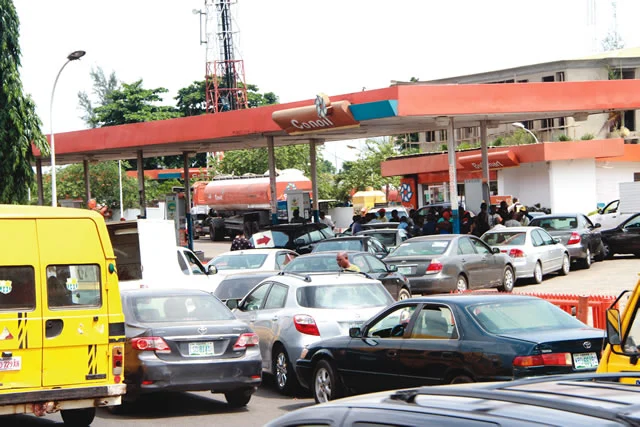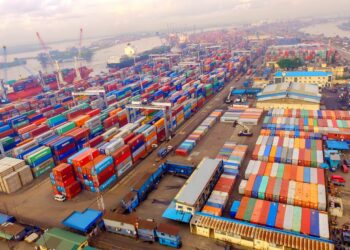As the current scarcity of fuel subjects Nigerians to more misery at filling stations across the nation, the federal government seems to be faced with the dilemma of deregulating the downstream oil sector or sustaining the payment of petrol subsidy, which has already surpassed N4 trillion, and projected by the IMF to exceed N8 trillion in the 2022 fiscal year.
The Major Oil Marketers Association of Nigeria (MOMAN) has consequently recommended a gradual price deregulation with targeted palliatives (transport and agricultural subsidies) to the public to ease implementation, citing that the current supply framework cannot guarantee steady and consistent supplies to the country given the current state of government finances and unpredictable international supply shortages.
According to MOMAN, as part of permanent measures to curb fuel scarcity, marketers should also be allowed free and fair play in the importation of products.
However, MOMAN chairman, Olumide Adeosun, said, “Oil marketers have consistently complained about their inability to import products due to forex scarcity, rising inflation, including excess and multiple import charges and taxes by the customs and relevant government agencies.
“The current scarcity of petrol was occasioned by supply inadequacy in the last few weeks as well as distribution challenges created by the unavailability and continuous surge in international prices of diesel. In the interim, MOMAN recommends that the current single supplier strategy be reviewed.”
While marketers are openly asking for subsidy removal, experts note that there are too many odds against the petrol subsidy removal.
They argued that there are obvious concerns about the potential political cost to government and ruling party, especially with the impending elections; also there are worries about the social cost given the excruciating poverty in the country. There is also the waning goodwill of government which is a reflection of the citizens’ trust in government.
Speaking on the current issue, the Major Oil Marketers Association of Nigeria (MOMAN), called for the full deregulation of the petroleum downstream sector and full implementation of the Petroleum Industry Act (PIA) 2021.
The association declared that PIA implementation clearly remains the most viable long-term solution to the country’s supply and distribution challenges, adding that given the current state of government finances and unpredictable international supply shortages the situation would likely not abate.
However, in the interim, the association recommended that the current single supplier strategy be reviewed, and that the Federal Ministry of Petroleum Resources, in collaboration with the Ministry of Finance and other relevant MDAs, should set up a taskforce to immediately focus on increasing diesel supply through accelerated initiatives to increase local modular refining capacity. “This move will tackle the supply and distribution challenges,” he said.
Adeosun also said the MOMAN had recommended a phased rehabilitation of existing NNPC refineries to hasten supply of middle distillates (AGO & ATK).
While empathising with its customers as the nation grapples with recurrent scarcity of Premium Motor Spirit (petrol) in various parts of the Country, Adeosun, disclosed that the gap was noticed in April when Lagos Jetty was supplied with 438,000 metric tons, MT, of petrol and down to 213,100 MT, and as at 20th of June it went down to 140,000MT.
On his part, an economist Dr. Muda Yusuf, observed that the whole subsidy story has become a political economic matter. It was shifted from the realm of economics and investment to the political realm.
Yusuf, who is the CEO of Centre for the Promotion of Private Enterprise (CPPE), expressed fears that under the current subsidy regime, macroeconomic risks would become elevated as fiscal deficit and borrowing significantly surpasses projections in the 2022 budget.
He said the Central Bank of Nigeria (CBN), would continue to cover financing gaps through ways and means, which he notes has serious inflationary implications. “The macroeconomic outcomes would adversely impact on the exchange rate, leading to further depreciation of the currency,” he said.
Executive secretary, of Depot and Petroleum Marketers Association of Nigeria (DAPPMAN), Olufemi Adebayo Adewole, pointed out that the on-going Russia-Ukraine War has adversely affected the world, including Nigeria and its adverse impact on the international prices of fuel and food supply, had resulted in a corresponding increase in local prices of goods and services.
The DAPPMAN noted that the situation has had its adverse effects on the operating cost of managing the various petroleum products depots in Nigeria.
“You would note that the petrol we supply is sourced, solely from NNPC Limited’s marketing subsidiary, Petroleum Products Marketing Company Limited (PPMC) for our onward sale to the public at the regulated price of N165 per litre.
“This purchase from the PPMC is achieved through funds sourced with high bank interest charges, alongside increased costs of hiring vessels utilised in the delivery of fuel cargoes to our depots.
“This is coupled with the intense scarcity of bunker fuel for running these vessels with increase in the cost of diesel used in powering equipment and machineries in our depots and retail outlets,” added the statement.
Offering further explanation, Adewole, said that overtime, depot owners and the government have struggled to sustain supply of petrol at the current pump price of N165 per litre despite the huge subsidy cost to government and abysmal or no profit margins to the depot owners.
However he said, “But for its suspension, the implementation of the Petroleum Industry Act 2021 would have provided an ideal enabling environment by creating the free market in which demand and supply would affect fuel pump price.”
Chairman of the Lagos State chapter of the Independent Petroleum Marketers Association of Nigeria, IPMAN, Mr. Akin Akinriade, a telephone conversation with our Correspondent, said that since December 2021, the Nigerian National Petroleum Company (NNPC), Limited has not supplied products to the Satellite depot, Ejigbo in Lagos.
He said in the last six months marketers buy products from private depots who are now selling above government approved ex-depot prices.
According to him, the NNPC approved ex-depot price is N148 per litre but now private depots are selling between N162 and N165 per litre while regulated pump price is N165.
He said some of IPMAN members have shut down operations because they cannot afford to restock.
“Like I said we buy petrol from private depot operators between N162 and N165 per litre. Add this to N8 transportation and N2 handling charges, so since government insists we sell at N165 per litre we need an understanding from the authorities as we as operators cannot subsidise our customers. So that is the situation now,” he explained.
The national president of the association, IPMAN, Elder Chinedu Okoronkwo, told our correspondent that his members had complained of adjustment in ex-depot price of petrol.
He said, “Though some of my members complain that depots have hiked prices from N148 per litre to about N155 and above. Nevertheless, loading is ongoing because we are all in business so we have to go and load and sell and make profit.
“For Lagos it could be a little distribution challenge and unfortunate behaviour of motorists who would not believe when the authorities say there is fuel. Everyone would queue up because of a minor challenge.”
Yusuf, however, observed that sentiments among the citizenry are not favourable to the deregulation of petroleum product pricing or petrol subsidy removal and even some elites are curiously not persuaded on the justification for the subsidy removal.
He warned that if the policy transition is not properly managed, the risk of a social and political backlash could be quite high.
“No doubt there is a sound economic and business case in favour of fuel subsidy removal. But the social and political contexts are equally critical.
“Certainly, the subsidy is not sustainable, which is why there is a need to accelerate engagement with the relevant stakeholders to come up with a policy transition strategy that is sustainable, realistic and pragmatic. The conversation should not only be economic, but also social and political,” he said.
To get it right, Yusuf said government should expeditiously address the ongoing rehabilitation of our refineries.





![[EDITORIAL] Still Waiting For Autogas Policy To Gain Momentum](https://nationaleconomy.com/wp-content/uploads/2022/06/Autogas-75x75.webp)